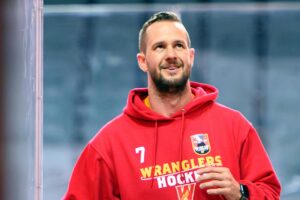![]() Patrick Williams, TheAHL.com Features Writer
Patrick Williams, TheAHL.com Features Writer
Various adages in life aim to ease the decision-making process. The circumstances for any of us can and will vary.
For one: Run toward something, rather than away from something.
Brett Sutter had one of those significant life – and career – decisions to make coming into this summer. As a free agent, he could pursue another contract and play an 18th professional season. Durability had always been one of Sutter’s best strengths. His 1,090 regular-season AHL games place him fourth all-time in league history. And certainly he still can play. Even in dealing with injuries this past season, he provided leadership and two-way reliability for the Calgary Wranglers.
Maybe he could scratch out another year.
“You’re wired one way for so long,” Sutter explained. “You know, you want to be a hockey player. You want to be in that locker room battling with the guys. For me, mentally, I was probably of the mindset that I can play forever.”
Still, the body does not heal as quickly as a 17-year pro. The wear and tear had really started to add up for Sutter, whose grinding, physical style defined so much of his career. Sutter began to take those aches, pains, and injuries as a sign.
“It was maybe time to move on.”
Calgary is home for the 37-year-old Sutter, who comes from one of hockey’s most storied families. The family farm sits about four hours away. He was selected by the Flames in the 2005 NHL Draft, and played his first three seasons in Calgary’s system before returning in 2022 with the Wranglers. Eighteen of his 60 career NHL games came in Flames colors.
When a vacancy opened on the Wranglers’ coaching staff for the coming season, Sutter saw an opportunity he could run toward in seeking his next challenge.
On July 15, Sutter officially retired and joined Trent Cull’s staff as an assistant coach. Having something line up so ideally is rare in any industry, but this was a great fit for both sides. Sutter could make a significant life change while not having to upend his family’s life. And for the Flames, they added someone who captained AHL teams for 10 seasons and captured the Fred T. Hunt Memorial Award in 2018-19 as the AHL player who best exemplifies the qualities of sportsmanship, determination and dedication to hockey.
“You’ll miss it all,” Sutter said of the transition away from playing. “You’re going to miss all the fun stuff, the good times, laughing after wins, playing cards on the bus, and dinners on the road. Competing during games. You’re going to miss all that stuff, but I think you’re going to miss the hard stuff, too. Getting yelled at by the coach as a team. The hard loss and sitting in that quiet locker room together, looking each other in the eye, and just knowing everything’s going to be OK.
“You miss the team part of it, having your teammates and your best friends sitting with you.”
That ability to build relationships is what the Flames want. Sutter came into the pro game as a 20-year-old, a late-round pick who had to make room for himself. He blossomed into an NHL recall option, a trusted veteran and a team captain. There were winning years and losing years. There were trades and there was scrapping for a new contract, especially as his career advanced.
“I think it’s probably those same experiences that I’ll try to take into coaching, understanding the players and how their emotions work and what they’re feeling on any given night.”
There will be plenty of learning still to come for Sutter. But he has plenty of examples to draw from – even beyond his father, long-time NHL head coach Darryl Sutter.
“I had a lot of good coaches along the way,” Sutter said. “(Former Ontario head coach) Mike Stothers is a guy I look at almost as a father figure to me. Chris Hajt was an assistant there. I was with those guys a long time and still keep in touch with them all the time.
“You know, Ryan McGill and Scott Allen when I was young. They worked so hard with me to get me caught up to speed, how to become a good pro, what it took on a day-to-day basis. Jeff Daniels and Geordie Kinnear (in Charlotte) were probably the two that first gave me a lot of confidence playing. I was coming out of being a young player and ready to take the next step, and they were the first ones to give me that opportunity and make me a captain for the first time.
“I could go on forever. There’s so many.”
Sutter may well become the type of mentor that coaches like so many others were to him.
“Coaching is probably the next closest thing to being a player,” Sutter said, “and being in that fight with those guys every night.”
On the American Hockey League beat for two decades, TheAHL.com features writer Patrick Williams also currently covers the league for NHL.com and FloSports and is a regular contributor on SiriusXM NHL Network Radio. He was the recipient of the AHL’s James H. Ellery Memorial Award for his outstanding coverage of the league in 2016.






































